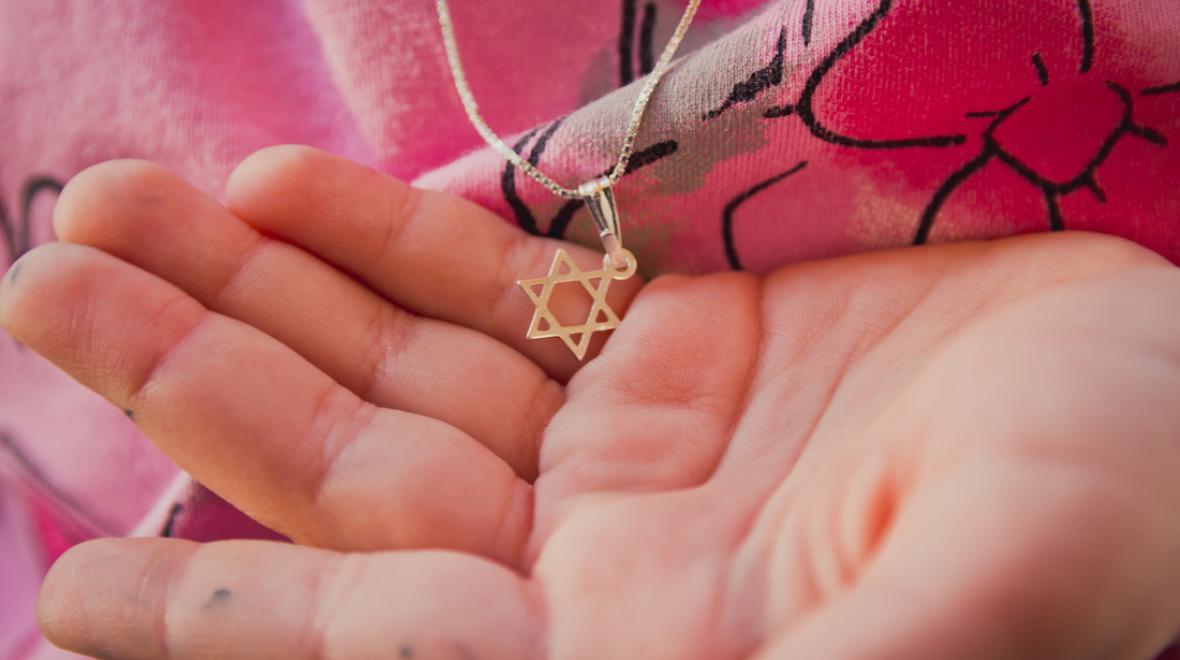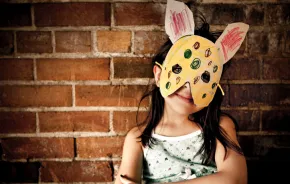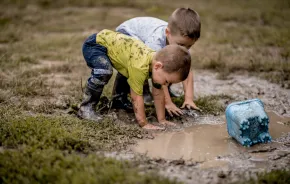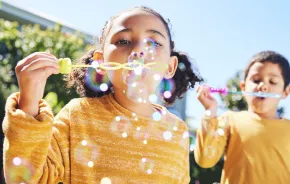
Photo:
According to the Anti-Defamation League, in 2023 there were 8,873 antisemitic incidents across the United States. This represents a 140% increase from the 3,698 incidents recorded in 2022 and is the highest number on record since ADL began tracking antisemitic incidents in 1979. Photo: iStock
Bigotry, close to home
Kids called Jack Kezner, a Mercer Island 6th grader, a “dirty Jew.”
A 7th grader in Shoreline felt uncomfortable when an Arab American Heritage Month display listed countries where Arabic was spoken; it included Palestine but omitted Israel.
Then there’s Seattle's Macklemore, who accused Israel of “apartheid” in his rap, “Hind’s Hall.”
Familiar fear
Jewish students everywhere are leaving their Star of David necklaces in their jewelry boxes, their silver menorahs inside cabinets. It is 2024 in the Northwest, not 1938 in Europe. Yet, once again, Jewish children – and their parents – find themselves trembling, just a bit, at the recent resurgence of antisemitism.
The upward trend of Jew-hatred began in 2016, years before the events of October 7, when Hamas terrorists killed at least 1200 Israelis and captured dozens more at a music festival, says Miri Cypers, regional director of the Anti-Defamation League (ADL). “We were on the brink of becoming more polarized,” she says. “We saw high disinformation levels on social media and an increase in hate.”
The ADL has seen a “steep rise,” says Cypers, in harassment and vandalism in synagogues, daycare centers, community centers and other Jewish institutions, along with college campuses and K-12 schools.
Incidents include bullying, school grounds painted with swastikas, and direct threats being made to students. “Antisemitic smears, such as using the ‘K’ word, Holocaust-related comments…it’s quite bad,” Cypers says. Many students, she adds, feel targeted. The bullying can be overt, such as blaming a Jewish student for the Middle East conflict.
Rise in hateful incidents fueled by lack of understanding
“We are hearing about teachers making sideways comments about Israel; about things in the curriculum that focus on a one-sided Palestinian narrative with no mention of the Israel narrative," says Rabbi Daniel Weiner, senior rabbi at Temple De Hirsch Sinai in Seattle and Bellevue.
Many people don’t understand anything about Jews, Judaism or the relationship Jews have with Israel, says Weiner. “Some are well-meaning but just don’t know. Others may be negligent or insensitive.”
Jared Nieuwenhuis, a Bellevue City Councilmember, finds that people simply don’t get antisemitism. “A fundamental step is to be able to define what it is: Bias, in speech and acts,” he says.
An active advocate for Holocaust education in the schools, Nieuwenhuis helped Bellevue adopt the recommendations of the International Holocaust Remembrance Alliance, which promotes Holocaust research, remembrance, and education worldwide. “A lot of people don’t know someone who is Jewish, and don’t have an appreciation for what Jews have contributed to our country,” he says.
“I am seeing outright antisemitism, especially on college campuses, and administrations that haven’t pushed back. This saddens me and angers me; they’ve been quick to push back to other forms of hate,” Nieuwenhuis added.
And as Evergreen State College teacher Nancy Koppelman points out in a Seattle Times op-ed on May 29, 2024, the employees at Seattle’s Wing Luke Museum who went on strike last May “expressed antisemitic ideas.”
Employees charged that the exhibit, “Confronting Hate Together” used what they called “Zionist language.” To be hostile toward Jewish Zionists is antisemitism, she says. “They should concede that Israel is a real country, that Israelis are citizens of that country…and that Jews get to define what counts as prejudice against them,” Koppelman writes.
"Good guys" vs. "bad guys" in local schools
Kids in Seattle-area schools are saying that if you are pro-Palestinian, you are on the “good team,” says a community activist who doesn’t want to be identified. “If you are pro-Israel, you are the bad guy.”
When a teacher explains that a swastika is a symbol that’s been used in many cultures, “that’s tone-deaf,” he says. “In context, it’s not a one-off mistake, but part of a broader attitude inside the school.”
Protests and shock across the U.S.
Nationally, spring quarter at many campuses brought a proliferation of tents and sleeping bags, set up at colleges and universities to protest Israel’s fight against Gaza, and included demands like calling upon universities to cut ties with organizations such as Hillel International, the Jewish on-campus organization that supports Jewish life; to divest from charitable foundations that fund Jewish academic research and life on campus. Demands also included banning “Zionist” speakers from campus, according to the ADL. One Columbia University student posted a video saying, “Zionists don’t deserve to live.”
Editor's note: In April 2024, shortly after this video was made public, Columbia University announced that the student who made this comment was banned from the campus. The student later issued a public apology for the statement.
Many young Jewish people react with shock when confronted with antisemitic acts or behavior. “Jews in the U.S. felt like this was a relic of the past,” says Cypers. “People didn’t realize what was happening in their own society until October 7.” That’s because as a nation, we’ve seen a decline in antisemitism, she notes. “But since 2019, antisemitism has doubled. Hate can lie dormant; when it is awakened, it can be very powerful.”
Why the attitude shift?
“We’ve been seeing a rise in extremism on the right and left. And the war has brought out a lot of ugliness,” says Cypers. “Many trends are coalescing at the same point to make it a hurricane.”
Jamie Kezner, Jack’s mom, says Islander Middle School didn’t contact her or her husband, Dan, after the student made the antisemitic remark to their son.
“Everyone involved should have been called,” says Kezner. The parents asked to meet with administrators, and ultimately sat down with the vice principal who suggested providing more instruction focused on hate, racism, and antisemitism. “That didn’t go anywhere,” she says. “There is no education about what antisemitism is – or means – at the school. This should be an educational opportunity, but schools seem to follow ‘the plan.’” Ultimately, the student was moved out of the class.
Shunned from both sides of the political spectrum
“Jews are not seen as a vulnerable population,” says Weiner. “To the extreme left, we are exploiting our history by using antisemitism. The extreme right feel we are displacing good, white Aryan supremacists and that our goal is to take over the world.”
Schools rarely cover what’s historically happened to the Jews. “Many don’t teach students about the Holocaust; they figure they need to cover every other group, and are more focused on Black, Latino, Muslim, and LGBTQ groups.” Schools don’t see Jews as a disadvantaged population, says Weiner. “They see Jews as successful."
But Weiner, along with the ADL, is speaking with principals, superintendents, and instructors, letting them know what parents, students, and community leaders are hearing and seeing. “This should be confronted and called out,” he says. “It may take lawsuits – and there are some percolating. We are not asking for special treatment." Just as parents and administrators insist students from other historically marginalized backgrounds are accepted and treated fairly, Weiner says, "we want the same for Jewish kids."
The Seattle-based organization Stop Hate in Schools recommends that parents and members of the community can share their concerns about antisemitism in classrooms by connecting with their school district leadership. Their site offers an easy-to-use portal for contacting school administrators, including example emails and contacts for specific schools.
What else can parents do?
Parents can initiate conversations with their children about what may be going on in their schools, with friends or on social media.
Here are recommendations from the Anti-Defamation League:
- Before talking with children or teens, make sure you feel prepared to discuss the incident and/or topic.
- Treat all young people’s questions with respect and seriousness.
- Answer questions as clearly and honestly as you can and use simple language in terms they can understand.
- Keep in mind that young people often struggle to understand why these incidents take place and what motivates people who perpetrate these crimes.
- Be alert for signs of distress in children.
- Ask young people what they are hearing from friends, classmates and through social media.
- It is always very useful to highlight for children the people who helped the victims and their families during these incidents as well as those who supported them afterwards.
More resources for parents exploring religion, spirituality and inclusivity with kids: |











